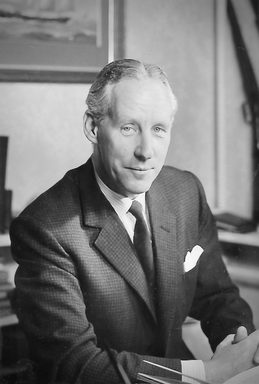
Neurosurgery or neurological surgery, known in common parlance as brain surgery, is the medical specialty that focuses on the surgical treatment or rehabilitation of disorders which affect any portion of the nervous system including the brain, spinal cord, peripheral nervous system, and cerebrovascular system. Neurosurgery as a medical specialty also includes non-surgical management of some neurological conditions.

Sir Hugh William Bell Cairns was an Australian neurosurgeon. For most of his life he lived in England. His concern about despatch rider injuries sparked research which led to increased use of motorcycle helmets.
John A. Jane, Sr. was an American neurosurgeon, and Professor of Neurosurgery at the University of Virginia. He was Chairman of the Department of Neurosurgery at the University of Virginia from 1969 to 2006.
Dr. H. Richard Winn is an American neurosurgeon, and professor of neurosurgery and neuroscience at Mount Sinai School of Medicine. Winn was chairman of neurological surgery at the University of Washington School of Medicine from 1983 to 2002. Winn has made numerous contributions to the field of neurosurgery, specifically to the physiology of cerebral blood flow regulation and clinical studies of the natural history of cerebral aneurysms. A leading international Neurosurgical Prize is named after Dr. Winn.
Paul Bucy was an American neurosurgeon and neuropathologist who was a native of Hubbard, Iowa. He is known both for his part in describing the Klüver–Bucy syndrome, his academic life as a teacher in the neurosciences, and for his founding in 1972 and editing Surgical Neurology – An International Journal of Neurosurgery and Neuroscience from 1972 to 1987.
Brian T. Andrews is a neurosurgeon specializing in pediatric neurosurgery, minimally invasive spinal surgery, brain tumors, neuro-oncology, neurotrauma, spinal stenosis and general neurosurgery. He is chairman of the Department of Neurosciences at California Pacific Medical Center and a founder of the California Pacific Neuroscience Institute.

Francis John Gillingham was a British neurosurgeon.

The Congress of Neurological Surgeons (CNS) is a professional association representing neurosurgeons, neurosurgical residents, medical students, and allied health professionals.
Sir Wylie McKissock, OBE was a British neurosurgeon. He set up the neurosurgical unit at the Atkinson Morley Hospital, was Britain's most prolific leucotomist (lobotomist), and president of the Society of British Neurological Surgeons.
Albert Loren Rhoton Jr., was an American neurosurgeon and a professor specializing in microsurgical neuroanatomy. He was on the editorial boards of six surgical journals, and worked as professor and chairman of the Department of Neurological Surgery at the University of Florida. He was also president of organizations such as the American Association of Neurological Surgeons, among other surgical organizations.

James Rutka is a Canadian neurosurgeon from Toronto, Canada. Rutka served as RS McLaughlin Professor and Chair of the Department of Surgery in the Faculty of Medicine at the University of Toronto from 2011 – 2022. He subspecializes in pediatric neurosurgery at The Hospital for Sick Children (SickKids), and is a Senior Scientist in the Research Institute at SickKids. His main clinical interests include the neurosurgical treatment of children with brain tumours and epilepsy. His research interests lie in the molecular biology of human brain tumours – specifically in the determination of the mechanisms by which brain tumours grow and invade. He is the Director of the Arthur and Sonia Labatt Brain Tumour Research Centre at SickKids, and Editor-in-Chief of the Journal of Neurosurgery.

Jacob Chandy was an Indian neurosurgeon and teacher of medical sciences. As the first neurosurgeon in India, he is widely regarded as the father of modern neurosurgery in India. In 1964, the Government of India honoured him with their third highest civilian award, Padmabhushan, for his services in the fields of neurosurgery and medical education.
Yoko Kato is a Japanese neurosurgeon. She is professor and chair of the Department of Neurosurgery at Fujita Health University. She was the first woman in Japan to be promoted to full professor of neurosurgery.

Ernest Sachs was an American neurosurgeon. The grandson of Goldman Sachs's founder, he became Professor of Neurosurgery at the Washington University School of Medicine in St. Louis, Missouri, in 1919. He was president of The Society of Neurological Surgeons from 1925 to 1927, and president of the American Neurological Association in 1943. Together with Harvey Cushing, he is known as the Father of Neurosurgery.
Stewart Dunsker M.D., a neurosurgeon, is Professor and Director of Spinal Neurosurgery at the University of Cincinnati College of Medicine, and Director of the Department of Neurosurgery at the Christ Hospital, Cincinnati, Ohio.

Dr. Basant Kumar Misra is a neurosurgeon specialising in treating brain, spine, cerebrovascular and peripheral nervous system disorders, injuries, pathologies and malformations. He is the Vice-President of the World Federation of Neurosurgical Societies, and the former President of the Asian Australasian Society of Neurological Surgeons, and the Neurological Society of India. He is a recipient of Dr. B. C. Roy Award, the highest medical honour in India.
The Asian Australasian Society of Neurological Surgeons (AASNS) is the inter-continental, non-governmental, learned society representing neurosurgeons of the Asian-Australasian region. It was founded in 1964 and is made up of twenty-eight national societies, totaling 60 percent of neurosurgeons globally. It is the largest of the five continental associations of the World Federation of Neurosurgical Societies. The official journal of the society is the Journal of Clinical Neuroscience.

Claire Karekezi is a Rwandan neurosurgeon at the Rwanda Military Referral and Teaching Hospital in Kigali, Rwanda. As the first female neurosurgeon in Rwanda, and one of the eight Rwandan neurosurgeons serving a population of 14 million, Karekezi serves as an advocate for women in neurosurgery. She has become an inspiration for young people pursuing neurosurgery, particularly young women.
Valentine Darte Logue FRCS FRCP was an Australian-born British neurosurgeon.
Chief Adelola Adeloye was a Nigerian neurological surgeon and academic who in 1971 together with Latunde Odeku described the Adeloye-Odeku disease.








